What is High Speed 2 (HS2)?
In February, Prime Minister Boris Johnson gave the go-ahead for the High Speed 2 (HS2) rail project.
HS2 aims to link London and the north of England via the midlands to overcome capacity constraints on the existing rail network and improve connectivity between the north and south of the country.
The ‘Y’ diagram of the HS2 line map proposes separate branches north of Birmingham extending northwards to Manchester and Leeds. HS2 will comprise 345 miles of new high-speed track and carry more than 300,000 passengers a day – around 100 million a year – when fully operational.
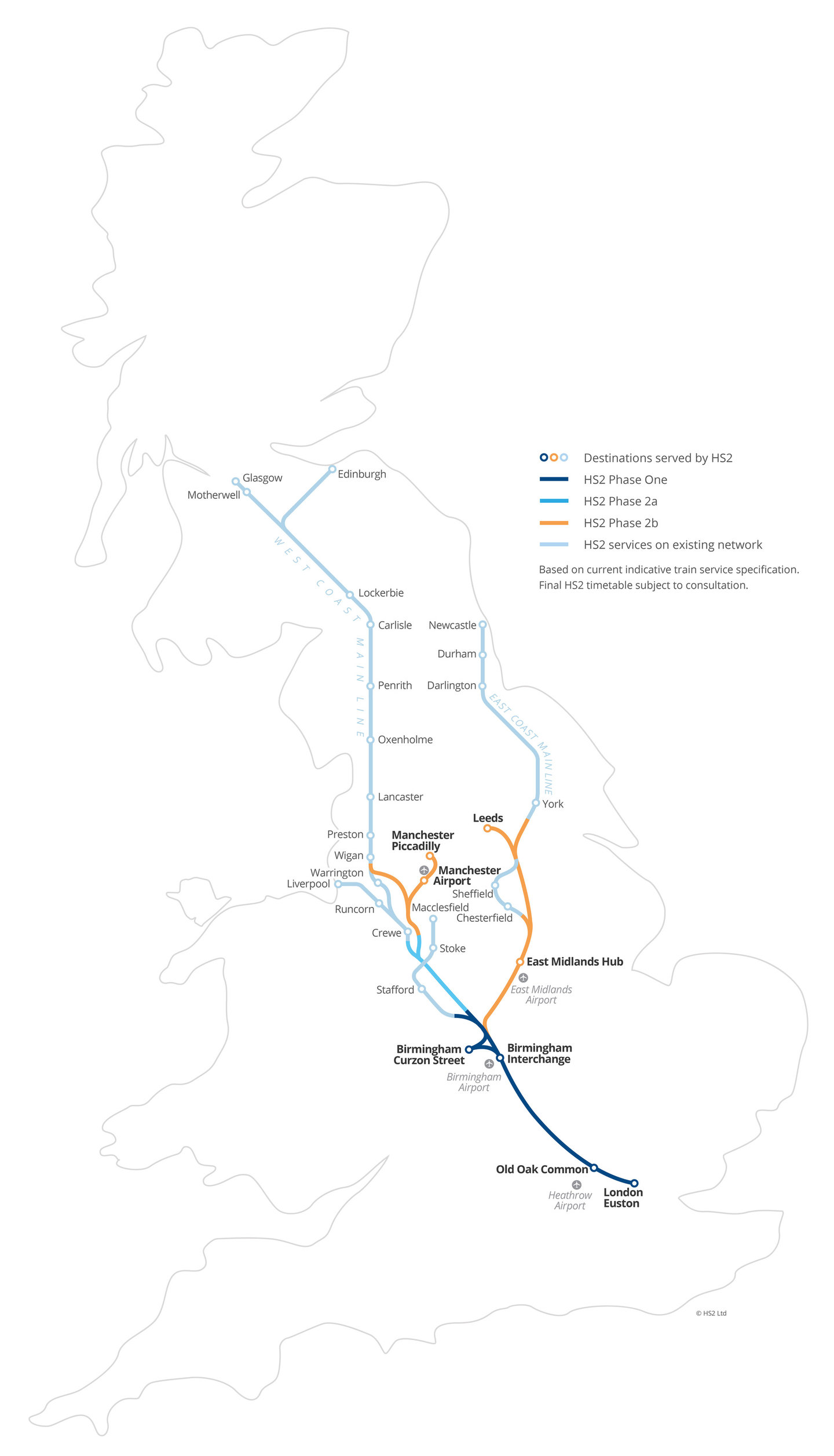
A 2019 map of the proposed HS2 route. Image: HS2
HS2 promises to make journey times considerably shorter; according to the Department for Transport (DfT), London-to-Birmingham travel times will be cut from one hour and 21 minutes to 52 minutes.
HS2 is designed to accommodate up to 18 trains per hour, more than any other high-speed line in the world. The trains will travel at up to 224mph (360km/h), faster than any other service in Europe.
When will HS2 open?
The first phase of HS2 from London Euston to Birmingham was originally due to open in 2026, but is now scheduled for 2028–2031. Phase 2a – Birmingham to Crewe – may also open in 2031. Phase 2b, the full line to Leeds and Manchester, could be delayed until 2040, seven years later than planned.
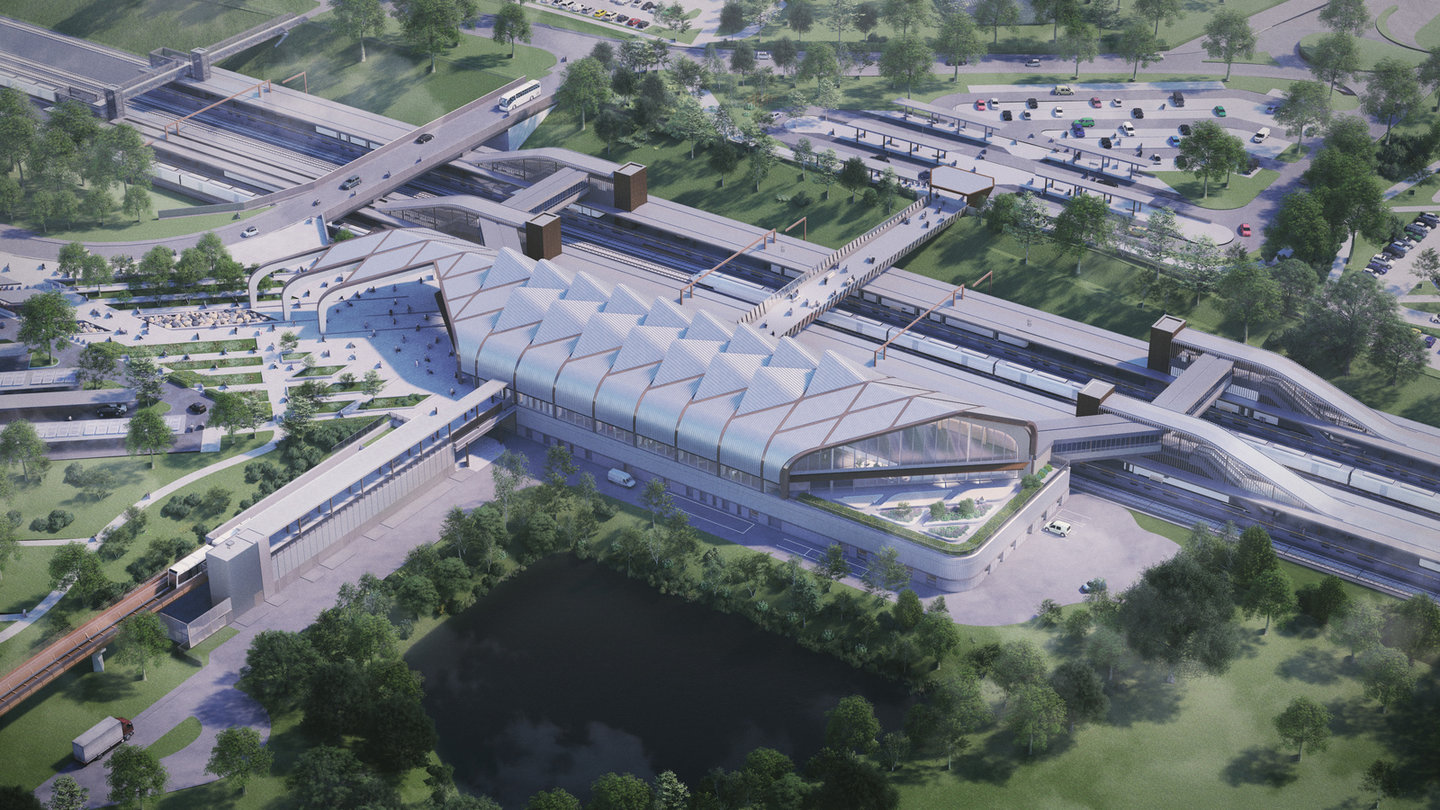
Construction work is ready to begin at the ‘Interchange’ station site near Birmingham Airport. Image: HS2
Preparatory work for phase 1 linking London and Birmingham has been ongoing since 2017 and the building of the high-speed railway itself is likely to start this spring, although the ongoing Covid-19 pandemic may affect the timeline. On 5 March, HS2 Ltd announced that construction work was ready to begin at the ‘interchange’ station site near Birmingham Airport.
Why has the project been delayed?
In September 2019, the Financial Times reported that planners working on the line failed to foresee the challenges of passing porous salt-mines, chalky rubble and ancient woodlands, partly because the ground conditions were “significantly more challenging than predicted”, according to HS2’s chairman Allan Cook.
Instead of carrying out extensive soil surveys before the HS2 bill, which was approved by parliament in 2017, estimates were derived from “desktop drawings . . . and without the benefit of any investigation of ground conditions or similar levels of detail across all areas of scope”, said Cook.
As a result, he added, the “stations, railway systems and integration plans are all less well developed than would be expected at this stage”. HS2 said it could not undertake extensive studies before the line was approved by parliament because it “didn’t yet have the legal powers to access land”.
In January, watchdog the National Audit Office (NAO) said HS2 was over budget and behind schedule because DfT and HS2 Ltd "have not adequately managed risks to taxpayer money". The NAO report said: "Significant challenges to completing the programme and delivering value for taxpayers and shareholders remain."
The following month, a BBC report revealed that HS2 property costs are forecast to reach £5bn, compared with the original £1.1bn estimate.
How much will HS2 eventually cost?
The project’s spiralling budget remains a subject of controversy. An estimate of £32.2bn was slated back in 2011, but by 2015 that figure had risen to around £56bn. In September of last year, current HS2 chairman Allan Cook published a report that put the project cost in the range of £81bn–£88bn.
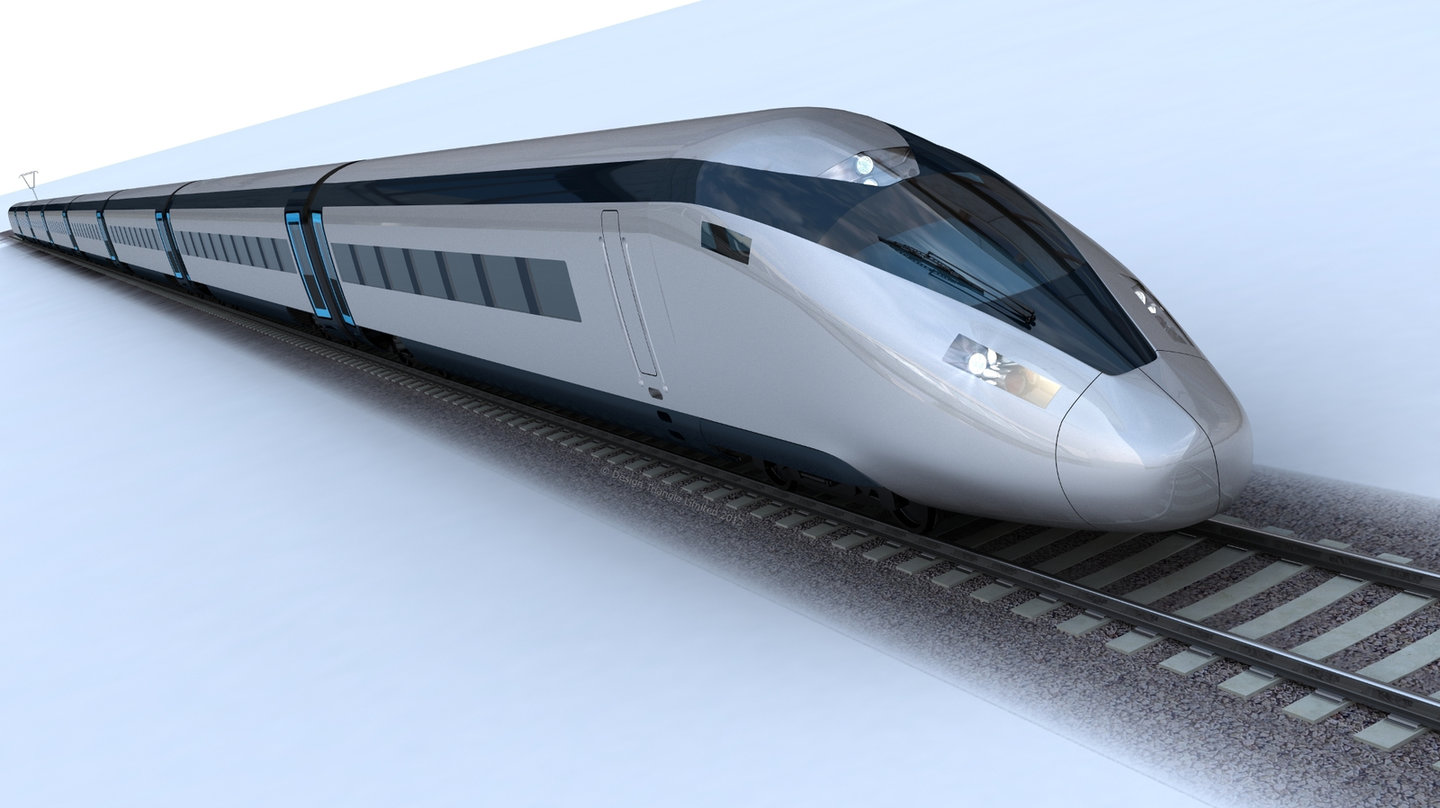
The overall cost of HS2 could be as much as £106bn. Image: HS2
According to DfT estimates at the time, phase 1 from London Euston to Birmingham will cost £40.5bn–£42.75bn, phase 2a from Birmingham to Crewe £4bn–£4.5bn, and phase 2b, the full line to Leeds and Manchester, £36bn–£40.5bn. According to NAO, the cost of HS2 is currently around £250m a month.
In January of this year, a government review led by former HS2 chairman Doug Oakervee concluded there was “considerable risk” that the price tag could increase by up to 20% to as much as £106bn.
Does the government commitment extend to phase 2b?
Work on the line from Birmingham to Crewe may now be rolled into phase 1, while phase 2 from Crewe to Manchester and Birmingham to Leeds will now be reviewed by the government to find ways to cut costs and ensure the high-speed lines are better integrated with the existing network.
"We have always supported the principle of HS2 but it is clear the current phase 2b route is the wrong solution for South Yorkshire," said Doncaster Mayor Ros Jones. "It will have a devastating impact on our communities, tear up our landscape, limit our economic potential and cap the future growth of our rail services in our region."
The final draft of the recent Oakervee review recommended that HS2 proceed “subject to a number of qualifications”. The report said that “further work” is needed to assess the scheme’s impacts on regional growth and it is “hard” to say what economic benefits will result from building it.
HS2 would need to be accompanied by investment in local transport and “transport investment alone will not ‘rebalance’ the UK economy”, it added.
Have alternative routes/solutions been proposed?
Speaking with Future Rail in June of last year, Alistair Lenczner, director of London-based Expedition Engineering and an advocate of high-speed rail in the UK, noted that HS2’s ‘Y’-shaped plan “makes no attempt to address rail connectivity across the Pennines in the north of England”.
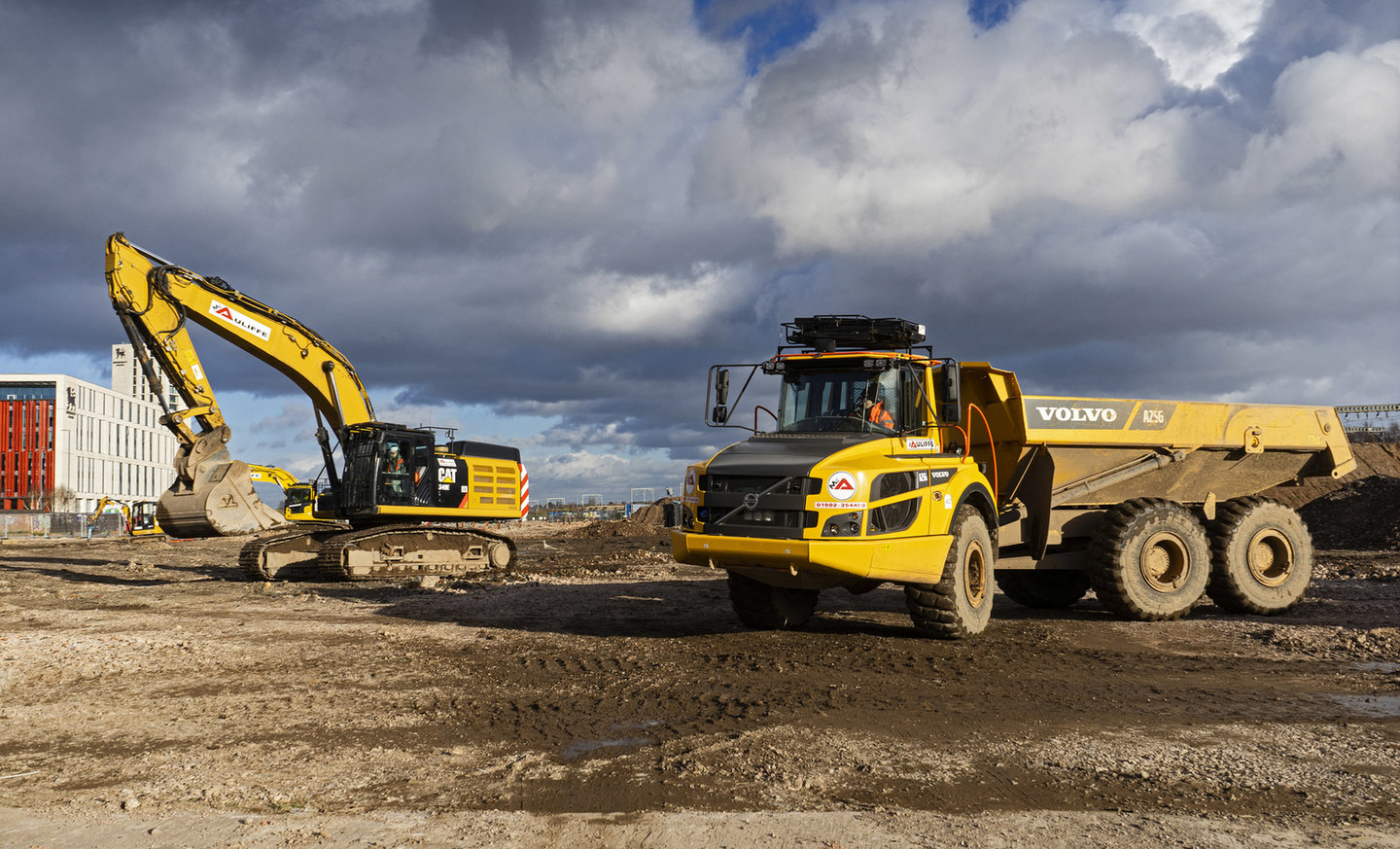
Construction work at the Curzon site plant in Birmingham. Image: HS2
“My HS2 North strategy proposes that a new trans-Pennine tunnel be built allowing high-speed trains running into the proposed new Manchester Piccadilly HS2 station to continue towards West Yorkshire and be shared by HS2 trains from the south as well as fast Northern Powerhouse Rail (NPR) trains between Liverpool and Leeds,” he said.
On Tuesday, the UK Prime Minister said there would be new "delivery arrangements" for the sections to Leeds and Manchester, plans that include a new HS2 hub next to Manchester Piccadilly.
Does the UK have enough skilled workers to complete HS2?
According to HS2 Ltd, the project is supporting 10,000 jobs nationwide, and around 2,000 businesses have already delivered works for HS2, 70% of them SMEs and 99% of which are based in the UK.
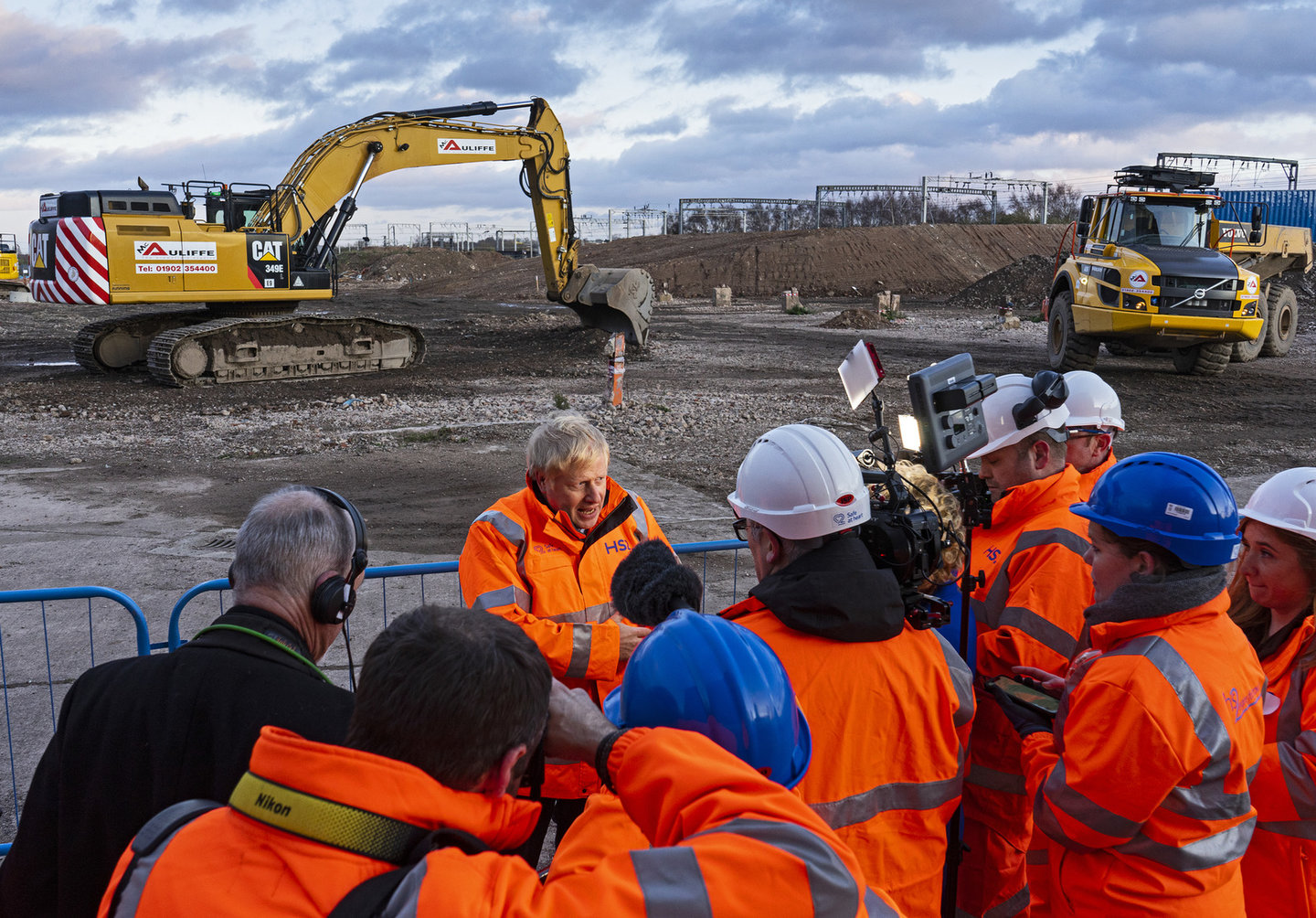
Prime Minister Boris Johnson green-lighted HS2 in February. Image: HS2
Speaking after the government’s decision to green-light HS2 in February, Tania Bowers, legal counsel at the Association of Professional Staffing Companies, said the project will require professionals from overseas, and that “there needs to be wider application or another visa route for the technically highly-skilled working in shortage occupations”, engineering and construction among them.
Adrian Adair, COO of recruitment company the Morson Group, said that "the skills gap is the biggest barrier to HS2”. He added: “The impact of Brexit has also meant further losses to the available skillsets to draw from, meaning now, more than ever, we need to broaden our talent pools into overseas markets to plug this gap.”
How will the Covid-19 outbreak potentially affect HS2?
New Civil Engineer reports that Covid-19 contingency planning by major UK construction sector employers is focusing on two factors: the “appropriateness of closing down work sites as a means of reducing the spread of coronavirus and subsequent impact on the NHS”, and the “contractual position of clients and suppliers in the event that disruption due to the pandemic either causes sites to cease working or suppliers to underperform under their contracts”.
A DfT source said: “Our position on the status of construction sites and the contractual conditions under which these are run has to be fluid as government policy concerning coronavirus is evolving day by day.”
